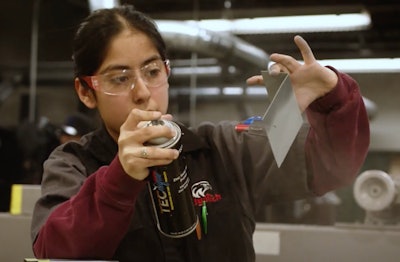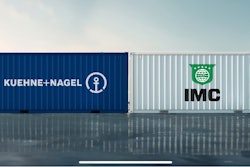
The following is the first of a two-part series that focuses on attracting women to careers as diesel technicians. The second part of the series, which looks at the challenges women face when trying to enter the field, will publish next week.
Taylor Johnson’s father worked as a diesel mechanic at a high school when she was a young girl, and she remembers helping him around the shop. It fueled her passion to pursue a career as a diesel technician.
Johnson attended Universal Technical Institute in Arizona and now works as the only woman diesel technician at Werner Enterprises’ Phoenix terminal.
While the male-dominated field is slowly opening its doors to more women, the growth isn’t fast paced despite a technician shortage.
Jim Mathis, president of WyoTech in Laramie, Wyoming, said he has seen women – though very few – in the diesel tech space ever since he began his career at the technical college in the 70s, but the number of women entering the field is ticking up.
“I think there are several reasons. One is good pay. The other reason, I think, is the technology of all this equipment,” he said. “It isn't like you have to be extra strong. We have amazing computer systems and everything else, and women are definitely smarter and more articulate and can figure out these things better than most guys can. So I think that has had a huge impact on exposing women to this wonderful field.”
According to data from the U.S. Bureau of Labor Statistics (BLS), 293,200 people were employed as bus and truck mechanics and diesel engine specialists (not including diesel techs in other industries) in 2021, but just over 1% of those were women. According to Women in Trucking Foundation, which offers scholarships for women seeking careers as diesel techs, women make up 3.7% of diesel techs.
Mathis said WyoTech currently has 30 to 35 women enrolled across its programs (automotive, collision refinishing and diesel), representing about 10% of its student population – the highest percentage of women WyoTech has ever had. Where the school in previous years has experienced a 1% to 2% increase in enrollment among women, it more recently has been experiencing a 5% to 7% increase, he said.
Among the 320 students enrolled in the school's next diesel program, he said he expects 15 to 20 women. But Ed Jolly can’t say the same. Jolly, a diesel instructor at Gordon Cooper Technology Center in Oklahoma, told CCJ he has one woman student among his high school and adult students about every other year. But he said enrollment is down among men as well.
The 2022 State of Diesel Technicians report, produced by Randall Reilly and sponsored by Shell Lubricant Solutions, includes the heavy-duty trucking, agriculture, construction and automotive industries, and it shows that more than half of people employed as diesel techs have been in trucking maintenance for more than 20 years.
[Related: Diesel students maximizing opportunities in tech-starved industry]
There are currently five generations in the workplace, and for every six retiring Baby Boomers with jobs in skilled trades, there are only two workers from younger generations filling those roles.
Data from the 2022 State of Diesel Technicians report suggests the majority of techs are aging toward retirement with 28% having worked in maintenance and repair for more than 30 years. Meanwhile, very few are entering the field to take their place as 1% of those in the field have worked less than two years in the profession, and 6% have worked only two to five years.
At the same time, demand for diesel techs is growing. About 28,500 openings for diesel service technicians and mechanics are projected each year, on average, over the next decade – many of which are expected to result from the need to replace workers exiting the labor force, according to the BLS.
“You can go to any shop in Oklahoma, and they're looking to hire somebody,” Jolly said. “There’s definitely a shortage.”
Mathis said he thinks the shortage is driving technical schools to focus more on recruiting women – tapping into a talent pool that has long been overlooked in this industry – and he expects to see a significant change over the next four to five years.
As more women join the diesel tech workforce, the more it will encourage additional women to do the same, he said.












